Update: The taverna Christiana that displayed Walter Lassally’s Oscar for “Zorba the Greek” burned down in January 2012 and the Oscar was destroyed. “I look upon it as the end of an epoch,” Walter wrote. “The Oscar had a good life, there are thousands of photos of it with me and with the mountain and beach that the film made famous.”
The independence, passion, spirit and wile embodied by Anthony Quinn’s portrayal of Zorba the Greek are still being nurtured on the tip of the Akrotiri Peninsula in northwestern Crete.
The village of Stavros, where “Zorba the Greek” was shot nearly fifty years ago, was the scene of a Mediterranean seaside lunch Wednesday featuring Walter Lassally, the 84-year-old Berlin-born, British-raised cinematographer who won an Academy Award for his work on the film based on the book by Nikos Kazantzakis.
Lassally, who “retired” to the seaside village thirteen years ago, loves the place so much that he has even bequeathed his Oscar to Christiana’s Restaurant. The much-handled statuette is on permanent display on the bar, though it may be moved to a planned local museum celebrating Zorba and Kazantzakis if it’s ever built.
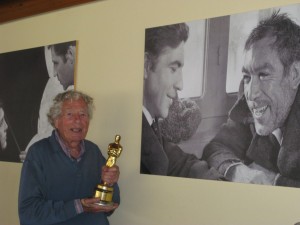
Walter Lassally with Anthony Quinn, Alan Bates, Irene Papas and his Oscar at Christiana’s Restaurant in Stavros, Crete.
Although Lassally recently moved to the nearby village of Kalathas, he frequently takes the short bus ride to Stavros to visit friends and have lunch at Christiana’s or Maleka’s Taverna. The comparatively sleepy village has been spared the onslaught of tourist resorts, large hotels and supermarkets, though there is one public telephone.
“When we shot Zorba there were no roads, no electricity, no water and no trees — and not too much has changed,” Lassally said while drinking a glass of honeyed raki on the sandy beach at Maleka’s. “I’ve been around the world and never found a place to live that’s better than this spot in Crete. It’s easy, relaxed and I like the volatile attitude of the mountain people.”
The director of photography, who has shot a dozen films in Greece and scores of others throughout the world, was best known for his work on “Tom Jones” before tackling Zorba. Today, perhaps subconsciously influenced by the verve and vitality of both movies, he’s living life to the fullest and seems to embody Zorba’s quote that “a man needs a little madness, or else he never dares cut the rope and be free.”
The multilingual Lassally (he speaks German, English, Greek and French) is learning Polish, will begin shooting a documentatry about the 1866 Cretan revolution next week, is organizing a pan-Balkan film festival in October and frequently takes his two dogs on long walks on the vast, arid, windswept peninsula. During lunch the conversation ranged from his thoughts about the director’s cut of “Heat and Dust,” the not-for-the-good changes in the Hollywood system, the ongoing collapse of the Greek economy and the jealous nature of Greek women to Zorba’s philosophy that “me I live as though I might die tomorrow.”
“Nobody around here thinks he’s Zorba the Greek,” Lassally said as he walked on the beach where he filmed the hilarious hillside logging accident and Zorba’s dance, which is now called the sirtaki and is an iconic cliché of Greek dance. “But we’re all fascinated by his story.”
Text and Photos: Joel Stratte-McClure

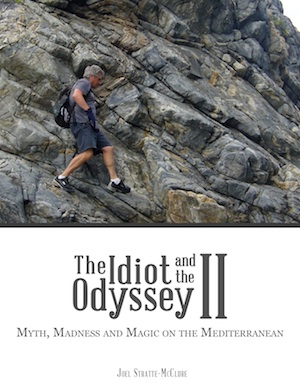


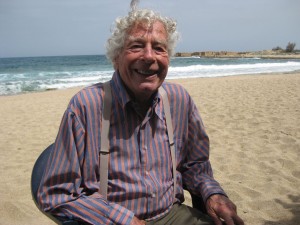
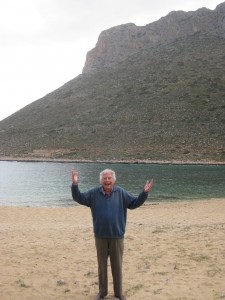
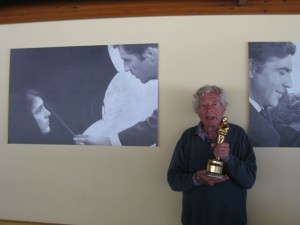
 Follow
Follow
6 Responses to Lunch With Walter The Greek